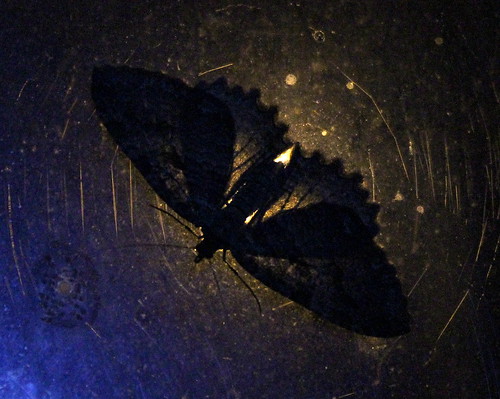 |
| Moth by night |
In chaos theory, the butterfly effect is the sensitive dependency on initial conditions in which a small change at one place in a deterministic nonlinear system can result in large differences in a later state. The name of the effect, coined by Edward Lorenz, is derived from the theoretical example of a hurricane's formation being contingent on whether or not a distant butterfly had flapped its wings several weeks earlier. Wikipedia
I remember that the "butterfly effect" was much in vogue in the late 1990s and was often quoted by the chaos theoreticians that were instrumental in designing the risk modeling that ruled finance up till 2008 and signally failed to predict the implosion of the financial system.
I think that today it would be more appropriate to talk about the "moth effect".
Moths are not as conventionally "pretty" as butterflies, but are often stunningly beautiful in a rather sinister way; and yes they flap their wings too and they often arrive in large numbers and eat their way through closets full of wool or gardens full of geraniums.
Unlike the butterfly, the moth is seen as a plague and a pest... you don't go to the store to buy "butterflyballs", do you?
And then, rather poetically: on balmy, breathless, summer nights, moths often commit suicide en masse in the flickering flames of dinner candles, driven by their love, need and obsession with light...
The romantic, sinister, light-driven and pestilent moth: a fitting symbol of our time.
The greatest clusters of metaphorical, wing flapping, wool chewing, suicidal moths that I detect today seem to me to be long term products of our economic system, such as the doomsday effect of global warming and the Oozlum bird effects of the advances in Artificial Intelligence.
Global warming is the long term effect of the industrial revolution and its spread to the entire globe, but so is Artificial Intelligence.
AI is the result of the geometrically accelerating drive for technological innovation, which we are told is wonderful and which will solve all our problems, but which in fact is not really a search for the greatest good for the greatest number, but on the contrary, generally driven by the intense dog eat dog competition of our economic system, where to avoid being eliminated, management and shareholders are constantly looking for greater efficiencies in cutting costs and getting more productivity with fewer people, even if this reduces the number of potential consumers. The now classic metaphor for this is Kodak, which once had 140,000 employees being replaced by Instagram, which had 13 employees when Facebook bought it.
Ironically, this pressure to innovate may finally be what fatally destabilizes our system. DS
I think that today it would be more appropriate to talk about the "moth effect".
Moths are not as conventionally "pretty" as butterflies, but are often stunningly beautiful in a rather sinister way; and yes they flap their wings too and they often arrive in large numbers and eat their way through closets full of wool or gardens full of geraniums.
Unlike the butterfly, the moth is seen as a plague and a pest... you don't go to the store to buy "butterflyballs", do you?
And then, rather poetically: on balmy, breathless, summer nights, moths often commit suicide en masse in the flickering flames of dinner candles, driven by their love, need and obsession with light...
The romantic, sinister, light-driven and pestilent moth: a fitting symbol of our time.
The greatest clusters of metaphorical, wing flapping, wool chewing, suicidal moths that I detect today seem to me to be long term products of our economic system, such as the doomsday effect of global warming and the Oozlum bird effects of the advances in Artificial Intelligence.
Global warming is the long term effect of the industrial revolution and its spread to the entire globe, but so is Artificial Intelligence.
One can imagine such technology outsmarting financial markets, out-inventing human researchers, out-manipulating human leaders, and developing weapons we cannot even understand. Whereas the short-term impact of AI depends on who controls it, the long-term impact depends on whether it can be controlled at all. Stephen Hawking and friends - Huffington PostBut long before it comes to all that, in the near future AI will be putting nearly everyone (except maybe the people who clip the toenails and give blowjobs to elderly billionaires) out of work.
AI is the result of the geometrically accelerating drive for technological innovation, which we are told is wonderful and which will solve all our problems, but which in fact is not really a search for the greatest good for the greatest number, but on the contrary, generally driven by the intense dog eat dog competition of our economic system, where to avoid being eliminated, management and shareholders are constantly looking for greater efficiencies in cutting costs and getting more productivity with fewer people, even if this reduces the number of potential consumers. The now classic metaphor for this is Kodak, which once had 140,000 employees being replaced by Instagram, which had 13 employees when Facebook bought it.
Ironically, this pressure to innovate may finally be what fatally destabilizes our system. DS
No comments:
Post a Comment